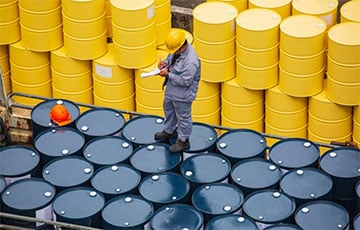Andrei Ozharovsky: Coronavirus May Trigger an Accident at the BelNPP
15- 27.05.2020, 8:12
- 54,166

The launch of the station during an epidemic increases its danger.
In recent days, the infamous Astravets nuclear power plant (NPP) has become the hotbed of the coronavirus epidemic. The Rosatom Corporation has detected about 100 cases of COVID-19 at the BelNPP site in Astravets.
Russian nuclear physicist Andrei Ozharovsky commented for Charter97.org on the situation with the epidemic at the BelNPP site:
- I do not think the hotbed of COVID-19 at this site is a surprise. In Russia, there are several cases when outbreaks of the epidemic occurred at construction sites. For example, the outbreaks at the construction of the shipyard in the Murmansk region, at a mine in the Krasnoyarsk region. 42 workers have contracted a dangerous disease at the Smolensk Nuclear Power Plant in Russia as well. NPP workers are not protected from the epidemic, as well as representatives of all other professions.
Meanwhile, they behaved as if the coronavirus would not affect them. Builders were isolated and it didn't work.
As a citizen of Russia, I cannot comment on the "competence" of the Belarusian leadership. Russia also has problems with competence among decision-makers. Again, work at a nuclear construction site or a nuclear power plant is not a protection against coronavirus, and consequences were inevitable.
The BelNPP leadership failed to freeze the construction. The world experience in combating COVID-19 is to reduce the number of contacts, including the shutdown of non-essential production. This would apply to the construction of the BellNPP since the launch has already been delayed by three years.
Therefore, it would be correct to suspend this construction for a year or six months. It would not be a disaster. The later this plant is put into operation, the better. It would have been better if it hadn't been completed at all...
- The first unit of the BelNPP is scheduled for physical operation in June. What can the launch of a nuclear facility, whose personnel is hit by the coronavirus epidemic, lead to?
- It seems to me that coronavirus is not the main hazard of nuclear energy. Of course, it is dangerous for the plant personnel. However, they work there and stay there voluntarily.
The launch of a nuclear power plant bears simple and clear consequences: it starts producing nuclear radioactive waste, including spent nuclear fuel. Radiation accidents and disasters may happen. This is the main danger. If the plant is launched, Belarus will not be able to stay out of the global crisis related to the inability to solve the problems of radioactive waste storage. This is the saddest thing.
There's one more interesting thing. The delay with the launch is significant. These deadlines will not be final. But if the plant is put into operation, Belarus will lose any arguments on the dispute with Russia over the payment for construction and repayment of the loan. After all, Rosatom failed to build the plant on time, the delay already equals to three years.
For the economy, when the deadlines are already, other obligations under the contract are also revised. If I am right, the leadership of Belaruswanted to bargain about interest on loans and so on. The launch of the station may nullify all attempts of the Belarusian authorities to bargain. Opportunities for manoeuvre on payment negotiations will be reduced.
- How much does the probability of errors during the operation of the NPP increase, if its employees fall ill with COVID-19?
- It strongly depends on the social security of its employees. I am not familiar with the Belarusian legislation, but the main task is not to let the sick person work. It sometimes requires making rather quick decisions. If sick employees can get sick leave and they are not forced to go to work, the danger from their actions is reduced.
But as far as I know, Belarus denies the very fact of the seriousness of COVID-19 at all. This can create additional danger. It's bad when a person with symptoms, and especially severe ones, is forced to work. This can add to the risks.
- What other consequences could an outbreak of COVID-19 at the NPP bring?
- The Belarusian NPP is dangerous regardless of coronavirus. Its construction plan has some violations. The construction of a new nuclear facility goes against world trends. The nuclear industry is dying out in Europe. Betting on a new plant now is just pandering to Rosatom. Most likely, it's not about energy but other reasons that have led to the fact that this dangerous facility may appear in Belarus.
I believe that in this already dangerous situation, the coronavirus has a minor impact, but it may be a "trigger" in terms of staff work.
Accidents at modern plants occur not through the fault of the personnel, but the fault of engineers and builders. However, remember that the human factor can also play a role. Although, main problems still relate to errors in the design and defects in the installation of equipment. We see that all this regards the Belarusian NPP. Poor operators, who may be exposed to viral diseases, are not the only danger at the BelNPP.
The introduction of the NNP during the epidemic may contribute to risks. No one knows what is going to be the trigger in the next accident. Nuclear power is such a difficult thing to manage that minor factors can cause great consequences.
- What conclusions can you, as a specialist, draw?
- I would recommend Rosatom to dissolve itself. This is a state Russian corporation, which sucks out money from the budget. Now the money is needed for completely different things. Unfortunately, the Belarusian NPP is not the only one being built by Rosatom: there is still one in Turkey, Bangladesh.
The Belarusian authorities could use the failure of Rosatom to fulfil the contract and conduct an economic recalculation to see that, regardless of the political regime, it will be wise not to complete its construction at all. It is enough to look at neighbouring Lithuania. Its economic calculations showed that such construction was irrelevant. People voted against the construction. One can even look at the Russian Kaliningrad region. The construction of the plant began a little earlier than in Belarus. Russia has decided not to complete it, although huge money was invested (much less than in Belarus now).
We see that Rosatom is also giving up its construction sites. So I would like to wish the Belarusian plant to follow the fate of the Kaliningrad one. But I'm afraid it will not happen. Again, I'm not sure that the dates mentioned are final. I can recall that the parties have mentioned different dates several times. They may continue to postpone the launch.
Remember that during the construction of the NPP, Belarus has violated the obligations under the two UNECE Conventions - Aarhus and Espoo, as well as significantly worsened relations with Lithuania when choosing the site for the NPP near Vilnius. The situation around BNPP is quite scandalous. The Belarusian project, even if it is launched on the announced date, will be added to the list of nuclear long construction sites and will confirm the world trend - the opening of NPPs never meet announced dates.











